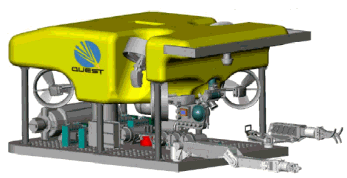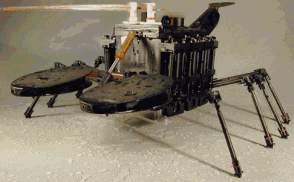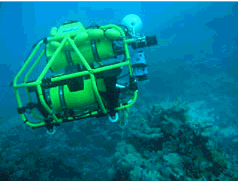|
|
Undersea Robots
|
 |
Undersea operations are a great
application for robotics to replace humans. Working
underwater is both dangerous and difficult for humans.
Schilling Robotics makes the system shown at left. This
system combines a remote operated vehicle with thrusters
for maneuvering and two robot arms for manipulating.
Note that one of the arms is almost a grappler. It can
grab something rigid, such as the base of an oil rig, to
steady the vehicle while the other arm performs such
tasks as welding and valve maintenance. |
|
|
|
The robot at right is a biomimetic
(mimicking biology) lobster developed by the
Northeastern University Marine Science Center.
Biomimetic robots may employ myomorphic actuators, which mimic muscle action; neuromorphic sensors, which, like animal sensors, represent sensory modalities such as light, pressure, and motion in a labeled-line code; biomimetic controllers, based on the relatively simple control systems of invertebrate animals; and
autonomous behaviors that are based on the actual
animal's behavior. If a robot like this goes walking
around on the ocean floor, I wonder if a big fish will
eat it? |

|
|
|
 |
The Australian Centre for Field Robotics at the University of Sydney developed the robot shown at
left as a prototype for autonomous underwater robots
that may one day explore and monitor the Great Barrier
Reef. At present this robot (called Oberon) must remain tethered to a ship on the surface, but
its inventors predict that within a decade it would be possible for robots to be lowered to the ocean floor and left to get on with mapping the
terrain on their own. Oberon has two scanning sonars and a depth sensor as well as a
color camera. It does not need any independent information, such as from global positioning system satellites, to work out where it is. |
|
|
|
|